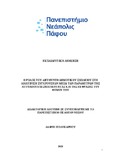Conflict management in public hospitals: the Cyprus case
| dc.contributor.author | Pavlakis, Andreas | |
| dc.contributor.author | Kaitelidou, D. | |
| dc.contributor.author | Theodorou, M. | |
| dc.contributor.author | Galanis, P. | |
| dc.contributor.author | Sourtzi, P. | |
| dc.contributor.author | Siskou, O. | |
| dc.date.accessioned | 2015-12-18T15:08:53Z | |
| dc.date.available | 2015-12-18T15:08:53Z | |
| dc.date.issued | 2001-06 | |
| dc.identifier.issn | 0020-8132 | |
| dc.identifier.uri | http://hdl.handle.net/11728/6803 | |
| dc.description.abstract | Background: Conflict among health-care personnel has been identified as an issue within health-care settings around the world. Aim: To investigate the existence and management of conflict among health-care personnel in public hospitals in Cyprus; to assess the factors leading to conflict among staff members; to evaluate the consequences of conflict arising; and to consider the management strategies. Methods: A self-administered questionnaire was completed by a random sample of 1037 health-care professionals in all (seven) state-run hospitals in Cyprus in 2008. Results: Mean age of respondents was 41 years, and 75% were female. Sixty-four per cent of respondents reported that they had never been informed about conflict management strategies, with physicians being the least informed as the relative percentage was 79.8% (c2 = 33, P < 0.001). Sixty per cent of health-care professionals reported conflict at work with other health-care personnel one to five times per week, and 37% of the respondents stated that they devote 90 min (mean value) from work during their shift in conflict resolution, meaning that managing conflicts may absorb 19% of working time daily. The majority of respondents agreed that organizational problems and communication gaps were the main issues creating conflict. Avoidance and collaboration were the preferable strategies for conflict resolution, used by 36.6% and 37.5% of the respondents, respectively. Conclusion: Better communication, fair management practices and clear job descriptions and expectations may be needed in order to facilitate change and reverse the negative atmosphere that exists. Further education in conflict management for physicians, nurses and their managers may also be needed. | en_UK |
| dc.language.iso | en | en_UK |
| dc.publisher | International Council of Nurses | en_UK |
| dc.relation.ispartofseries | International Nursing Review; | |
| dc.rights | © 2011 The Authors. International Nursing Review © 2011 International Council of Nurses. | en_UK |
| dc.rights.uri | http://creativecommons.org/licenses/by-nc-nd/4.0/ | en_UK |
| dc.subject | Conflict in Hospitals | en_UK |
| dc.subject | Conflict Management | en_UK |
| dc.subject | Conflict Management Strategies | en_UK |
| dc.subject | Conflict Resolution | en_UK |
| dc.subject | Cyprus | en_UK |
| dc.subject | Human Resources | en_UK |
| dc.subject | Workplace Conflict | en_UK |
| dc.title | Conflict management in public hospitals: the Cyprus case | en_UK |
| dc.type | Article | en_UK |
| dc.doi | 10.1111/j.1466-7657.2011.00880 |
Files in this item
This item appears in the following Collection(s)
-
Articles360
Άρθρα





